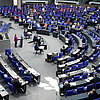Global health policy challenges
Global developments such as globalisation, demographic change and population growth as well as climate change and ecosystem degradation aggravate health risks, costs and inequalities world-wide.
Globalisation has far-reaching implications for public health. For instance, it favours the spillover of diseases and other health threats across national borders by amplifying travel and trade. This shows that health challenges cannot be overcome by one country or sector on its own, but only through cooperation.
Preventable deaths from infectious diseases and, increasingly, also from chronic non-communicable diseases hamper economic growth and development opportunities and compromise the social and political stability of entire regions.
However, globalisation not only confronts public health with challenges, it also offers a wealth of new opportunities and promising approaches to resolving these challenges. Increased mobility and novel communication processes have made access to medication, technology, knowledge and research considerably easier. Stronger international networking has helped secure health topics a permanent place on the international agenda.
With the Federal Government’s Global Health Strategy, Germany takes a forward-looking approach to addressing new challenges, such as the increase in antimicrobial resistance, or the emergence of cross-border infectious diseases such as the COVID-19 pandemic and highlights the importance of international cooperation, especially within the WHO context.
Current public health challenges
Additional information
-
Global Health Policy
Global health issues call for solutions that also transcend thematic boundaries. The ministry of health in Germany summarizes the most important facets of a modern global health policy.




























